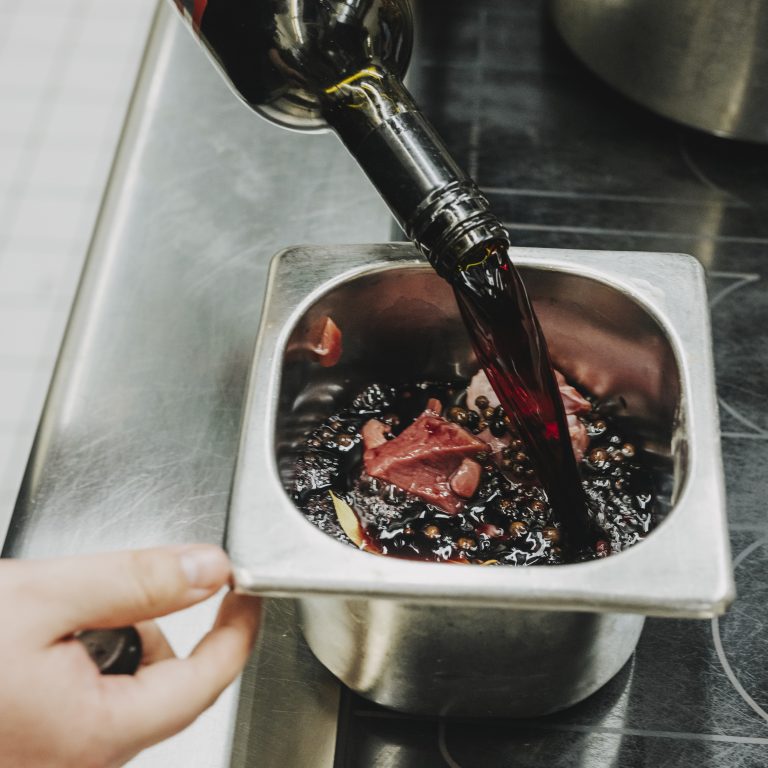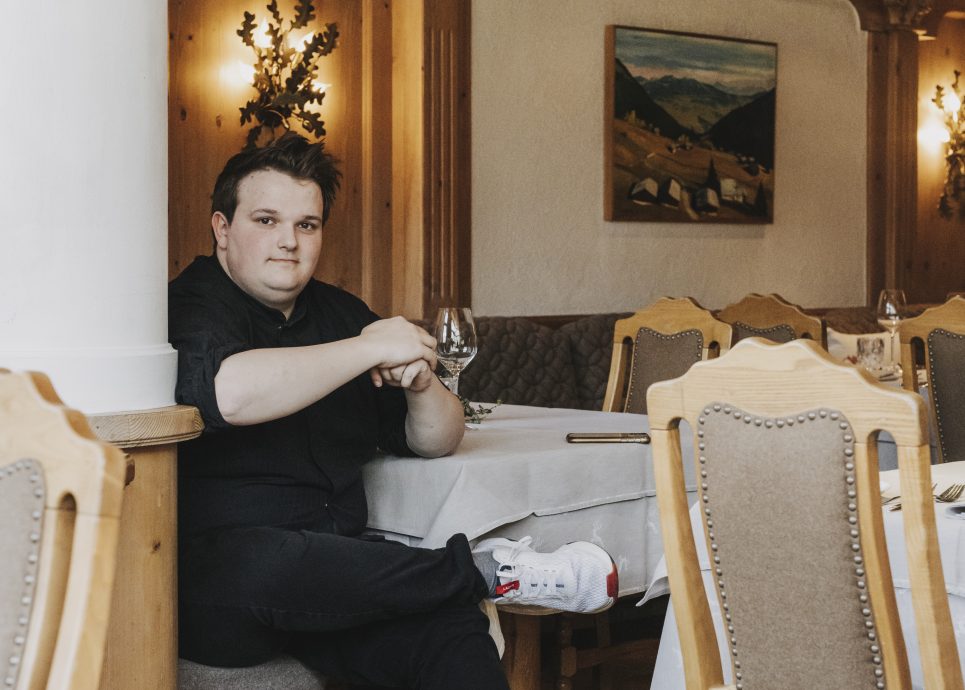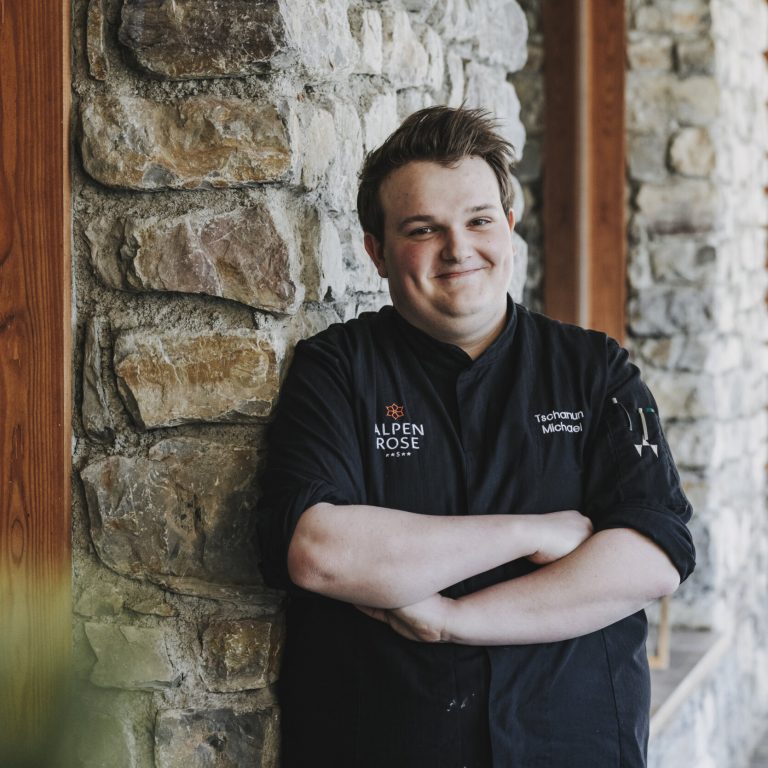



C Michael Tschanun © Angela Lamprecht / Vorarlberg Tourismus
Michael Tschanun
Head Chef Michael Tschanun of the AKTIV & SPA HOTEL Alpenrose in Schruns fondly refers to his cuisine as “Alpine-French." Today’s menu, for instance, features Hirschpfeffer venison ragout and classic side dishes such as pointed cabbage and filled celery pouches. The ingredients are sourced from the region and the hotel’s own garden and hunting grounds.
TEXT: DANIELA KAULFUS
March 2022
I can hardly believe my eyes as Michael Tschanun dishes up a proper welcome with a truly mouthwatering snack. His guests breathe in the aromas, take a bite, and immediately reach for more. “This is venison chorizo, dried meat, lard and fresh bread,” says the 26-year-old, pointing to the impressive platter. Emphasising that everything is homemade would be superfluous. After all, craftsmanship is a top priority at the AKTIV & SPA HOTEL Alpenrose in the village of Schruns. “We always make use of the entire animal. Sausages are made and we also process the offal. It’s about truly valuing the animal.” This includes an appreciation for regional origins. Game, including the venison that the young chef will prepare today, is hunted on the grounds of the Mäser family, who run the hotel.
In the rustic Montafoner Stube parlour, the small group, busy chatting and enjoying all the delicacies, might just linger a bit longer today. Meanwhile, the kitchen staff in the restaurant are cooking up enticing venison ragout along with some classic side dishes. There’s also always something new to learn: “The dish originally comes from French cuisine, which means that the basic ingredients must never be hidden. Everything has to be perfect,” says Tschanun with a knowing smile. Preparing such goodness takes time: The diced, smooth venison shoulder must mature in the wine for six days before moving on to the next steps. In addition to pinot noir, the marinade includes lightly roasted juniper berries, allspice berries, peppercorns and bay leaves. “Roasting them releases the essential oils that give the meat its typical flavour,” the chef explains as he heats up the ingredients and encourages the amateur cooks to appreciate the aromas.
Michael Tschanun describes his basic culinary style as “Alpine-French.” He also enjoys being inspired by international colleagues as well as his suppliers. “I talk a lot with my team, but also to farmers. I ask them what they prefer to do with the ingredients they make. I really listen up when I note their enthusiasm, that they stand behind their products one hundred percent. I really like passing on this joy to our guests every evening.” He also shares this palpable joy with his 14-member kitchen team – and with us today.
One big family
The overall positive working atmosphere at the hotel is no coincidence: Some years ago, the Mäser family switched to year-round operation in order to retain their skilled professional staff year round. Since that time, the five-day week has become the norm at the AKTIV & SPA HOTEL Alpenrose. Duty rosters are fixed three weeks in advance. Any overtime is recorded digitally and becomes compensatory time. Training and continuing education are a matter of course. For their part, employees show their appreciation through their many years of service and low turnover rate. “We are one big family here, which is what I enjoy most,” says Michael Tschanun. “It’s a dream come true.”
A native of Montafon, he first gained experience in several local companies and in Switzerland. Unlike other young chefs, however, he wasn’t drawn to work abroad. “I think everything one needs in life is available from the shores of Lake Constance to the heights of Piz Buin,” he says earnestly. “Everything that gives me strength is here.” When it comes time to press his “reset button,” as Michael Tschanun calls it, he heads fishing at the Kopsstausee reservoir or other fishing areas such as the Roter Stein and Nenzing. “Those are places where I can spend the entire day without a mobile phone. That’s where I recharge my batteries.”
Close to nature
His closeness to nature is also reflected in his cooking. “I like to collect herbs that grow around the hotel, e.g. wild garlic, thyme, salad burnet, thistles and nettles. We also grow lots of fruit here. Every summer we process up to 300 kilograms of our own plums.” Pasta, sauces and bread are also made in-house. “There are so many products these days that include flavour enhancers and preservatives. We’ve banned all such things from our kitchen,” says the young chef, describing how easy it is to make soup extract in house: “Roast vegetables in oil, dry, blend, salt and done.”
In the meantime, Tschanun pours the homemade game stock and the boiled wine into the pan, adds the meat and lets it braise. Soon, a spicy aroma whets our appetites, even though the snack was not long ago. Meanwhile, the cook cuts celery and carrots into cubes, which he later adds to the venison. Celery is also a key part of the side dishes: the tuber, previously cooked in the oven and on sea salt, is now soft enough to be sliced thinly with the meat slicer. Michael Tschanun cuts these out with a round cookie cutter, places a teaspoon of prepared mashed potato on top, and folds the celery slices into a crescent shape. “The celery contains so much starch that the edges stick together on their own,” he explains. He then warms the pouches in clarified butter with lovage powder, pepper and grated nutmeg.
Next, Michael Tschanun lifts a large stoneware mortar onto the countertop and adds a handful of roasted Piedmont hazelnuts. He lets everyone sample the large, aromatic nuts before proceeding to grind them with the pestle. He soon uses them to refine the finely chopped pointed cabbage, which has been tossed in butter.
Regionality ensures availability
Only recently has the chef begun to source vegetables almost exclusively from Vorarlberg producers. The chef explains, tongue-in-cheek, how he was able to “persuade” the Mahlerhof farm in Höchst to deliver to “faraway Montafon.” Similarly, lamb comes from Christoph Maier and beef from the Metzgerei Salzgeber butcher in Schruns, whilst pork comes from Gauensteiner Hof farm in Schruns and from the Flötzerhof farm in Wolfurt. The latter also supplies poultry. Last but not least, fish is sourced from Fisch Bösch in Gaißau and Nino Mayer in Dornbirn. “Thanks to regional foods, we’re crisis proof. This was one of the lessons we learned from the coronavirus pandemic. Such sources are also sustainable,” says Tschanun with satisfaction.
Speaking of sustainability, the chef also introduced smaller portions. “We’ve been able to drastically reduce waste and our guests really appreciate that. After all, it makes sense not to overeat in the evening at a wellness hotel. Those who are still hungry can have seconds at any time.” He treats his guests to a somewhat larger portion. For this purpose, he lifts a few pieces of meat with the root vegetables from the braising pan onto a plate, pours over stock and then garnishes with crispy fried pancetta, bread cubes, diced mushrooms and chives. In separate bowls, he portions the celery pouches and pointed cabbage. Not soon after, at the beautifully decorated table in the restaurant surrounded by cosy wood and candlelight, we sample the results: The meat melts in the mouth like butter and the vegetables harmonise deliciously with the game. Small wonder that the hotel enjoys many regular guests from Germany and Switzerland: good taste unites like-minded souls.